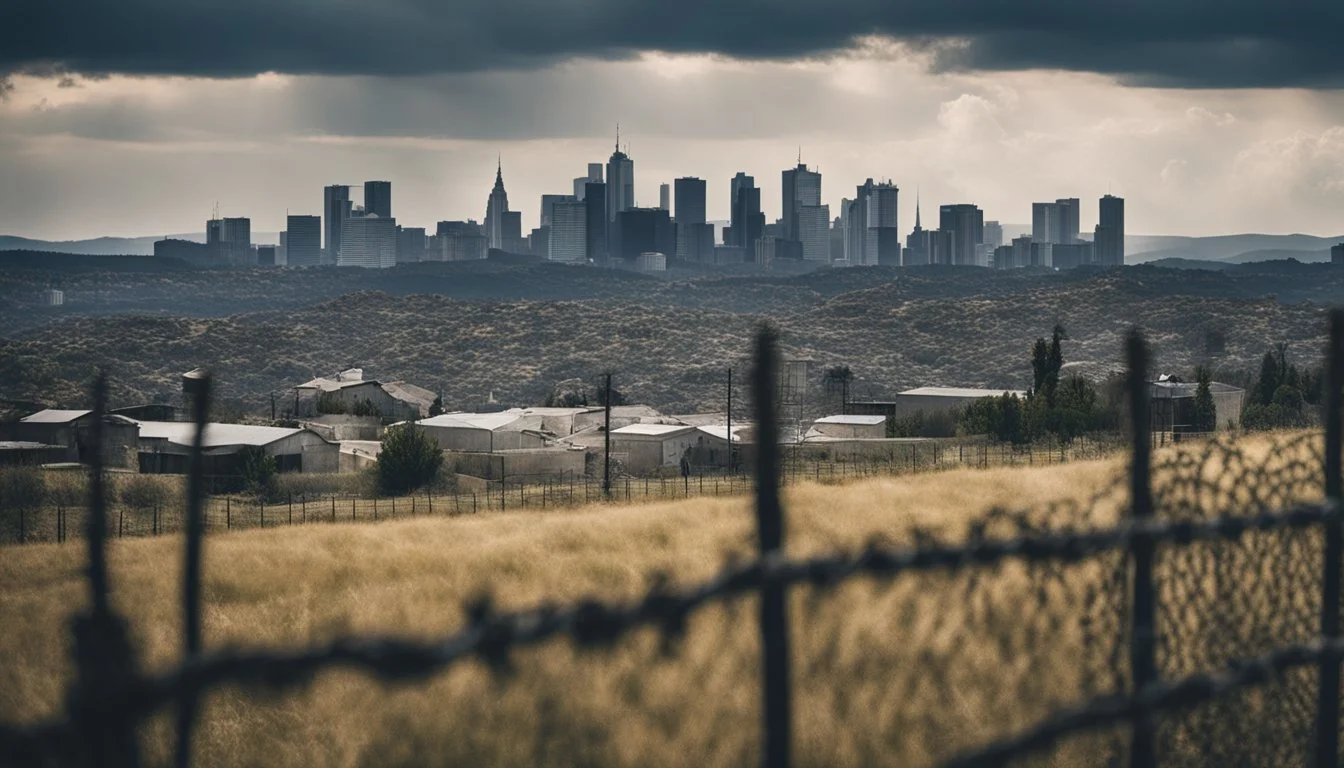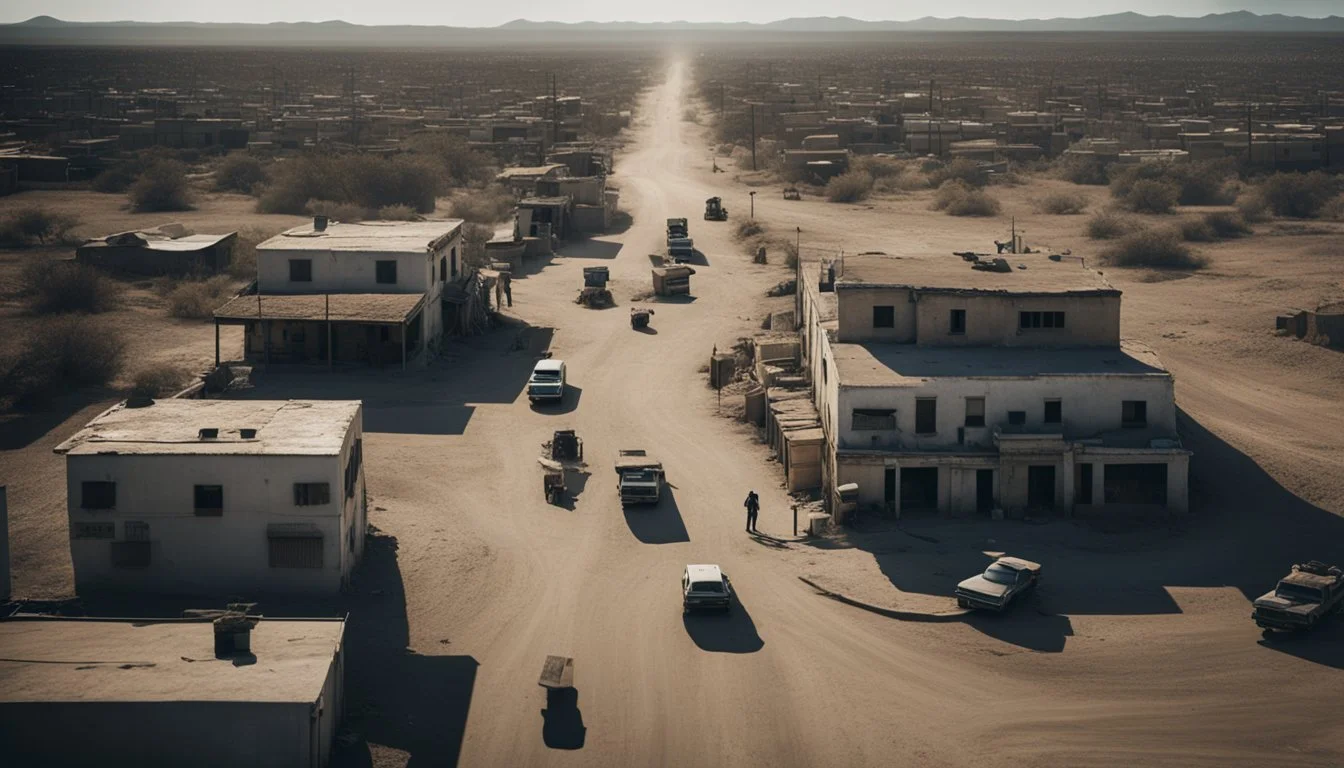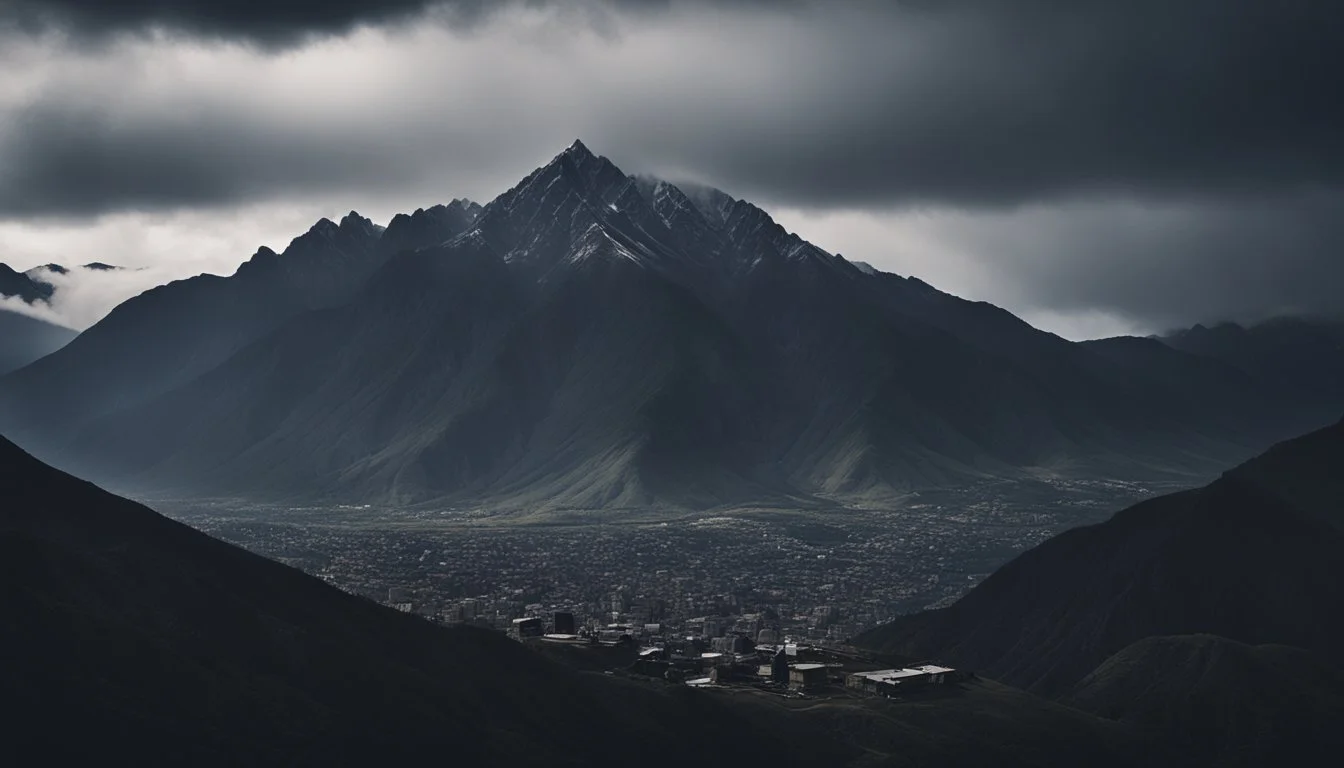8 True Crime Documentaries About Drug Cartels in Border Towns
Riveting Tales of Power and Intrigue
Drug cartels have long been a gripping subject for true crime enthusiasts, especially those operating in precarious border towns. Documentaries on this topic provide a raw and unfiltered look into the violence, corruption, and human stories deeply intertwined with these cartels. These stories are not only captivating but also essential in understanding the broader implications of organized crime on border communities.
For anyone seeking to grasp the full extent of drug cartel operations in these volatile regions, these documentaries offer an invaluable perspective. They explore the daily lives of those caught in the crossfire, from law enforcement officers to ordinary citizens, revealing the complex and often tragic reality behind the headlines. Through these films, viewers gain a deeper insight into how cartels influence both sides of the border and the ongoing struggle to combat their pervasive reach.
1) Cartel Land (2015)
Cartel Land is a documentary directed by Matthew Heineman. Released in 2015, it provides a gritty look at the violent world of Mexican drug cartels.
The film focuses on two vigilante groups. The first is the Autodefensas, led by Dr. Jose Mireles in Michoacán, Mexico. This group aims to combat cartel violence in their region.
The second group is Arizona Border Recon, led by Tim "Nailer" Foley. Positioned on the U.S. side of the border, they target cartel activity attempting to cross into the United States.
Playing a significant role, Dr. Mireles emerges as a key figure against cartel operations. His commitment to rallying community defense reflects the intense realities facing these towns affected by cartel violence.
For more details: Cartel Land on IMDb.
2) Narco Cultura (2013)
Narco Cultura is a documentary that delves into the influence of drug cartels on Mexican and American culture, specifically within border towns. Directed by Shaul Schwarz, the film takes a hard look at the glorification of the violent narco lifestyle through music and media.
The documentary primarily follows two individuals: Edgar Quintero, a narcocorrido singer, and Richi Soto, a crime scene investigator in Ciudad Juárez. Quintero’s music celebrates the powerful and dangerous lives of drug cartel members.
On the other hand, Soto’s daily work involves dealing with the grisly aftermath of cartel violence, highlighting the stark contrast between the glorified image and the brutal reality. This juxtaposition serves to underscore the complex and often contradictory perceptions of cartels.
Narco Cultura paints a vivid picture of how deeply embedded cartel culture is within certain communities. The film does not shy away from graphic or disturbing content, illustrating the true extent of the impact of drug-related violence.
For more information, you can visit the Wikipedia page on the film.
3) Cocaine Cowboys (2021)
"Cocaine Cowboys: The Kings of Miami" is a 2021 docuseries that delves into the lives of Miami drug lords Sal Magluta and Willy Falcon. Directed by Billy Corben, this six-part series covers their rise to power and eventual indictment in one of the largest drug cases in U.S. history.
Sal Magluta and Willy Falcon were notorious for smuggling 75 tons of cocaine into the United States. Their operations were highly sophisticated and they managed to evade law enforcement for years.
The docuseries combines elements from Corben's original "Cocaine Cowboys" documentary and its sequel, giving viewers a comprehensive look at the Miami drug scene.
Watch Cocaine Cowboys: The Kings of Miami to learn more.
4) Traffic Stop
"Traffic Stop" (2017) investigates a seemingly routine traffic stop that escalates dramatically. Focusing on the experiences of a specific individual, this documentary delves into the wider implications of law enforcement's interactions with minorities.
The film sheds light on systemic issues within policing, showing the often dangerous consequences that can arise from these encounters.
Additionally, it addresses the broader societal impact by providing a relatable yet alarming account that urges viewers to consider the need for change.
It is a poignant piece that stimulates critical thought about civil rights and justice.
For more information, visit IMDB.
5) Operation Odessa (2018)
"Operation Odessa" provides an unmatched glimpse into the underbelly of the criminal world in the early 1990s. Directed by Tiller Russell, the documentary follows three friends who set out to orchestrate a daring scheme.
The plot centers on a Russian mobster, a Miami playboy, and a Cuban spy. These unlikely partners aim to pull off an audacious heist by selling a Soviet submarine to a Colombian drug cartel.
Ludwig Fainberg, also known as "Tarzan," is at the heart of this thrilling narrative. The documentary captures his exploits as he manages to deceive multiple authorities and agencies.
The film includes gripping conversations captured in wiretaps by the DEA and FBI, adding a layer of authenticity. The stakes and the sheer boldness of the plan make "Operation Odessa" a standout true crime story.
"Operation Odessa" unfolds from Brooklyn to Miami to Moscow, offering a worldwide perspective on this incredible escapade. It stands as a vivid portrayal of how criminals can exploit global networks for their gains.
For further details on this wild true crime film, visit its IMDb page.
6) Drug Lords
"Drug Lords" (2018) is a docu-series that takes an in-depth look at infamous drug-dealing cartels and their kingpins. The series highlights figures such as Pablo Escobar, El Chapo, and the Cali Cartel, providing a detailed examination of their operations.
Each episode delves into a specific cartel or kingpin's rise and fall. Through interviews with law enforcement, gang members, and journalists, the series offers a comprehensive view of the brutal and often violent world of drug trafficking.
Dramatizations of key events punctuate the interviews, offering a vivid portrayal of the significant moments in the history of these criminal empires. This blend of documentary and dramatization helps to both inform and engage the audience.
By focusing on multiple cartels from different parts of the world, "Drug Lords" provides a global perspective on drug trafficking. The series captures the intricate network and the far-reaching impact of these criminal organizations.
For more information, you can visit IMDb.
7) Murder Mountain (2018)
Murder Mountain is a six-episode true crime documentary series released on Fusion TV and later picked up by Netflix. It premiered in 2018. The series explores Humboldt County, California, an area infamous for its marijuana industry.
The documentary focuses on the dangerous and often deadly conflicts within the local black market cannabis trade, highlighting the disappearance and murder of Garret Rodriguez among others.
Murder Mountain delves into the complex social dynamics and law enforcement challenges in the region. The marijuana industry's illegal aspects bring numerous dangers to those seeking quick riches.
The setting, Alderpoint, California, is a remote area with a reputation for violence and illicit activities dating back to the 1980s. This series offers an inside look at the harsh realities faced by those living and working in this notorious part of Northern California.
For more information about Murder Mountain, visit IMDb or Wikipedia.
8) Kingdom of Shadows (2015)
"Kingdom of Shadows" by Bernardo Ruiz is a gripping documentary that examines the U.S.-Mexico drug war. It takes viewers through the harrowing realities faced by communities on both sides of the border.
The film focuses on three individuals: a U.S. drug enforcement agent, an activist nun, and a former Texas smuggler. Each of their stories sheds light on different aspects of the drug war.
The documentary highlights the human cost of the conflict, emphasizing the suffering endured by families and communities. With real-life footage and personal narratives, Ruiz paints a vivid picture of the pervasive violence and despair caused by drug cartels.
Through its compelling storytelling, "Kingdom of Shadows" provides a deep insight into the complexities of the border drug war. This film serves as an essential resource for anyone seeking to understand the profound impact of this fight on human lives.
For more information on "Kingdom of Shadows," visit the IMDb page.
The Impact of Drug Cartels on Border Town Communities
Drug cartels significantly affect border town communities, influencing both economic conditions and social dynamics. These impacts are complex and multi-faceted.
Economic Consequences
The presence of drug cartels disrupts local economies. Legitimate businesses often suffer due to cartel-related violence and corruption. Tourism, a critical economic driver in many border towns, declines as safety concerns escalate. Additionally, small businesses face extortion from cartels demanding "protection" fees.
Employment and Wages: Legal job opportunities may diminish, while illegal activities provide alternative income sources. This shift affects wage structures and employment stability, exacerbating economic inequality.
Property Values: Real estate devalues as residents move away to escape violence. Abandoned properties increase, creating financial burdens for local governments managing these neglected areas.
Social and Cultural Changes
Drug cartel activities deeply alter social fabric. Fear and mistrust permeate communities where violence is prevalent. Social interactions become limited as people avoid public spaces.
Community Institutions: Families often struggle with the loss of members to violence or incarceration. Schools may face declining attendance and increased dropout rates. Healthcare facilities are strained by treating victims of violence and dealing with mental health issues stemming from trauma.
Cultural Shifts: Cultural norms shift as communities adapt to living under the threat of cartel influence. Traditional values may weaken, giving way to survival tactics that prioritize safety over communal bonds. Initiatives to counteract these effects, such as community policing and social programs, become essential in rebuilding trust and stability.
Law Enforcement and Counter-Drug Operations
Efforts to combat drug cartels in border towns involve various strategies and tactics, with authorities facing numerous challenges along the way.
Strategies and Tactics
Law enforcement agencies deploy both preventive and reactive measures. Preventive tactics often include intelligence gathering and community engagement to identify and disrupt cartel activities before they escalate. Advanced surveillance technologies and undercover operations play crucial roles in gathering critical information.
Reactive measures involve rapid response units trained to handle violent confrontations. Joint task forces are frequently formed, combining resources from local, state, and federal levels, to enhance operational efficiency. Cross-border collaborations with international entities also help in tackling the transnational nature of cartels.
Challenges Faced by Authorities
Authorities encounter numerous obstacles in counter-drug operations. The sheer resource limitations—both manpower and technological—often impede efforts. Corruption within law enforcement bodies further complicates the mission, leading to compromised operations and insider leaks.
Violence is another formidable challenge as cartels are well-armed and ruthless. This creates high risks for officers and civilians alike. Additionally, the legal constraints and varying laws between bordering countries can hamper coordinated efforts against cartel networks.
These strategies and challenges define the landscape of law enforcement's fight against drug cartels, highlighting the complexity and danger inherent in these operations.
Psychological Effects on Residents
Residents of border towns affected by cartel violence often experience severe psychological impacts, including trauma and mental health issues. These problems can have lasting effects on their well-being and daily lives.
Trauma and Mental Health
The constant threat of violence creates a pervasive sense of fear and insecurity among residents. Witnessing violent acts or losing loved ones to cartel activities can lead to post-traumatic stress disorder (PTSD).
Children in these areas are particularly vulnerable, often showing signs of anxiety and depression. The disruption of community structures and the normalization of violence further exacerbate these issues.
Access to mental health services is usually limited, complicating recovery. Additionally, the stigma associated with seeking psychological help can prevent individuals from getting the assistance they need, worsening the long-term effects.






